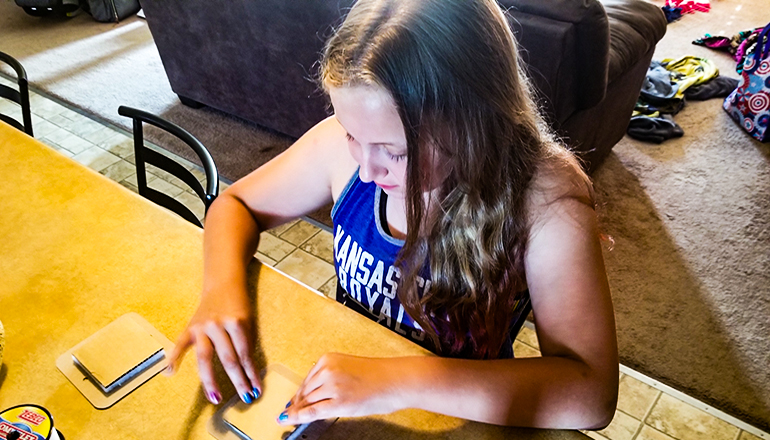With in-person summer camps canceled due to COVID-19, Missouri 4-H went to work creating new opportunities for youths to make as many summer memories as possible.
“A combination of ‘camp in a kit’ and virtual experiences gave youths throughout the state a platform to continue to learn by doing, socialize with their peers and caring adults, and experience the traditions of in-person camping from afar,” said Laura Browning, assistant extension professor, University of Missouri Extension 4-H Center for Youth Development.
While virtual experiences at a computer screen might sound like the opposite of camp, 4-H’ers were able to enjoy many of the same activities, though in different formats. “Options included everything from STEM projects and crafts to virtual campfires, with something for everyone, with or without devices,” Browning said.
Becky Simpson, the 4-H youth development specialist, said missing out on in-person camping this year was hard, especially around the time she would have normally been welcoming counselors and the excited but nervous campers arriving at Camp Crowder in Grundy County. Campers even missed the ritual of gathering items such as the trusty air mattress, shower shoes, bug spray, and camp towels.
Simpson was also keenly aware of Missouri 4-H’s responsibility to provide an experience that was both engaging and educational. “Our reputation was on the line,” she said. “Parents who signed up their kids for virtual camp trusted us to deliver a quality product.”
Tech issues added to the challenge: A number of families lived in areas with limited internet, so the use of live sessions had to be scaled back in favor of prerecorded content.
BTC Bank sponsored camp T-shirts and Farmers Bank of Northern Missouri provided backpacks. Bank representatives also gave sessions on saving money for 4-H projects.
The backpacks were stocked with items such as PVC pipe and dowel rods for making bows and arrows, materials for science experiments and craft projects, and ingredients for making no-bake cookies. “The campers got so much for just $20,” Simpson said. “Parents thought it was kind of like Christmas.”
It was a relief to see how much the 4-H’ers enjoyed the retooled summer camp experience, Simpson said. “The kids were really good about helping one another in our live sessions. It was cool to see them interact with each other and do what kids do.” Camp counselors hosted a dance party via Zoom. There was a prerecorded nighttime hike featuring encounters with frogs, raccoons and spiders.
Karla Deaver, 4-H youth development specialist in Lawrence County, said this year’s unusual 4-H “stay-at-home camp” for southwestern Missouri was organized to involve not just individual 4-H’ers but the whole family. “Parents, younger siblings—everybody was invited to sign up and participate.”
During June, a list of activities to choose from went out by email every Monday, Deaver said. Each Friday was a campfire on Zoom. Campers documented their participation with photos or videos, which they could either submit by email or upload to the 4-H Facebook page for southwestern Missouri.
While the format “doesn’t replace face-to-face camp,” Deaver said, “it gave parents a better understanding of what we do.”
Chelsea Corkins, 4-H youth development specialist in Saline County, said there was a concerted effort to accommodate families with limited internet access. Flash drives containing videos, camp songs, and other content were distributed. Files could also be downloaded from Box, a popular cloud storage service.
Corkins said the virtual camp attracted youths who might have been reluctant to attend the regional in-person camp in Benton County, and that it appealed to families that would have had to struggle to pay the fee for regular camp. “It was an opportunity to reach new audiences.”
What about camp next year? Like most of the world, the Missouri 4-H community hopes that things will be back to normal—or something close to it—in 2021.
“Would I do it again? I hope not,” Simpson said. “Will I have to? If that’s the way we have to reach kids, that’s what we’ll do.”







